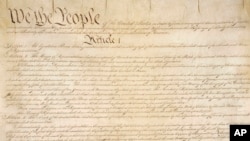"We the People of the United States, in Order to form a more perfect Union, establish Justice, insure domestic Tranquility, provide for the common defense, promote the general Welfare, and secure the Blessings of Liberty to ourselves and our Posterity, do ordain and establish this Constitution for the United States of America."
These words from the Preamble to the United States Constitution are a brief introductory statement of the Constitution's fundamental purposes and guiding principles. It serves solely as an introduction, and does not assign powers to the federal government, nor does it provide specific limitations on government action.
The framers of the US Constitution believed that political action should be conducted through institutions that derive their authority from the citizens. The republic they wanted to establish would depend on a system of frequent elections, division and balance of power, autonomy of the civil service, civilian control of the military, the enactment of laws and regulations by elected representatives, and their impartial enforcement. And the power of the national government would be checked and balanced by the powers of the state governments.
The framers wanted to spare the United States the fate of Europe, which they saw as hobbled for centuries by the arbitrary rule of tyrants, protracted wars, court intrigues and factionalism. They wanted political institutions that were as transparent, accountable, and inclusive as possible.
One striking aspect of the American system of government is that, while the United States is one country, American constitutional law recognizes a federation of state governments separate from (and not subdivisions of) the federal government, each of which has an important degree of sovereignty over its own affairs. However, each state's sovereignty is limited by the U.S. Constitution; which is the supreme law of the land, defining and limiting the powers of both the federal and state governments. In the event of a conflict, a valid federal law supersedes.
In 1863, in the midst of a terrible civil war which threatened to destroy the union established by the Constitution, President Abraham Lincoln reaffirmed the essential character of the United States government, as defined in the preamble. He called it “government of the people, by the people, for the people.”
And it remains so today.






